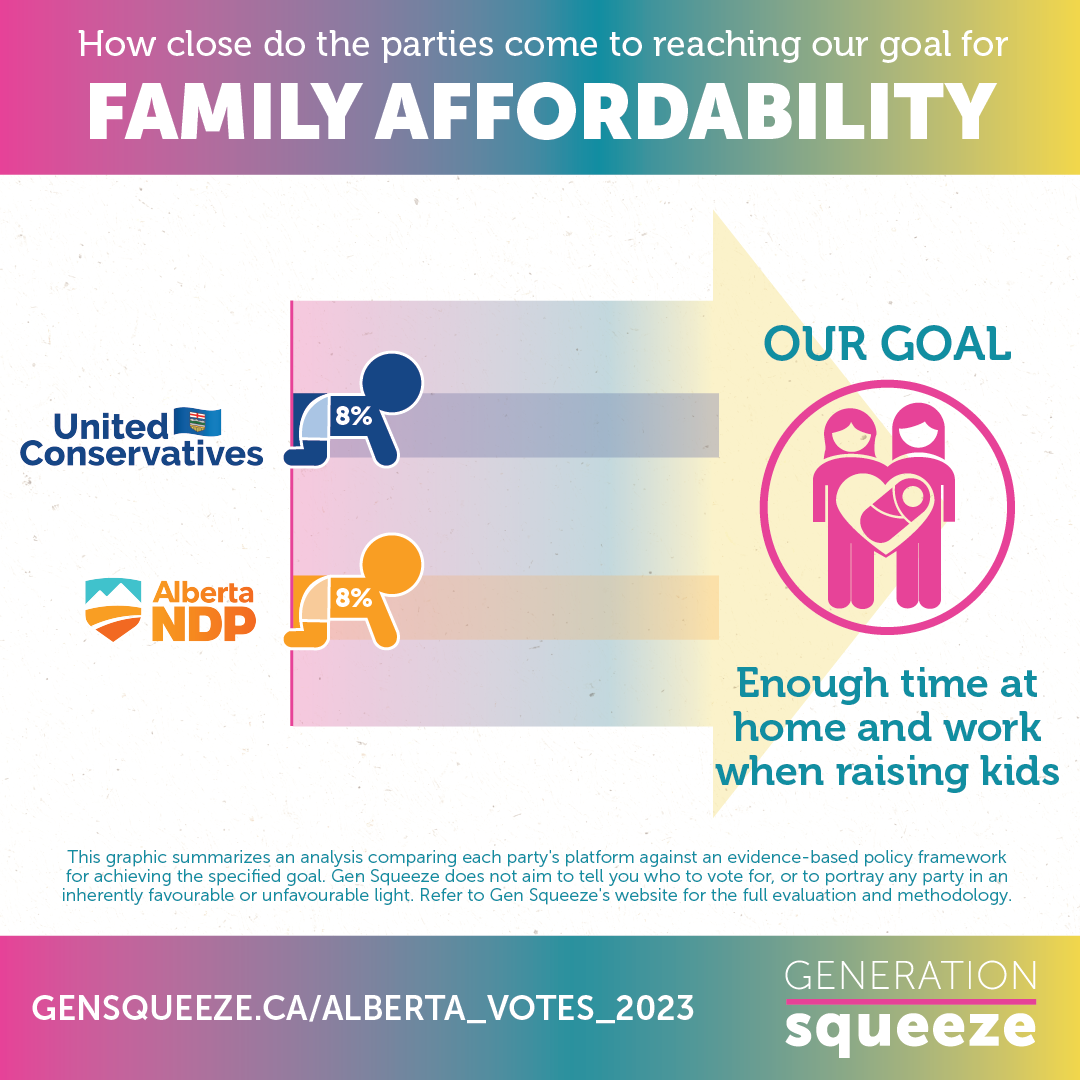Support strong Canadian climate journalism for 2025
Despite all the talk about affordability in the lead-up to the Alberta election, the UCP and Alberta NDP promise relatively little to address the big financial costs facing young families.
A new study from Generation Squeeze finds that both the UCP and the Alberta NDP commit to deliver just eight per cent of the concrete policy actions needed to support young families at the critical moment in their lives when they are planning for and having children. Alberta parents, and those hoping to become parents, should expect more from the two parties campaigning to lead the province for the next four years.
The most significant promise from both parties is money for $10-a-day child care. Much of the public funding that pays for this fee reduction comes from Ottawa. Given that UCP Leader Danielle Smith champions the Alberta Sovereignty within a United Canada Act, it’s ironic that she relies on federal investments to deliver the largest savings the UCP offers to Alberta families with kids.
With this federal funding, her platform promises to drop fees to $10 a day for all Albertans by 2026 and create more child-care spaces. The party highlights some of these spaces will be delivered by private child-care providers, but doesn’t address evidence that quality tends to be lower in private settings.
Rachel Notley’s NDP promises to add $1 billion to accelerate the implementation of $10-a-day child care over the next three years. This makes the NDP financially stronger on child care, offering a timely display of provincial leadership on this critical issue — rather than just riding Ottawa’s coattails.
However, the party says little about how it will spend the extra money. Of the 40-plus policy commitments described on the Alberta NDP campaign website, there isn’t one that speaks directly to helping Albertans afford enough time at home, or enough time at work, when they start their families. That’s a big hole the party urgently needs to fill.
Neither party takes steps to ensure that $10 a day is the maximum fee for child care, not just the average. This is a failing, because we should apply the same logic to child care as public education and medical care. More affluent individuals are asked to pay more via taxes — not via higher fees at the door.
When we charge higher fees to affluent families, we incentivize them to search for private options. This will risk robbing the new publicly funded child-care system of the support it needs for long-term success and survival. Albertans don’t tolerate this risk for education and health care, as signalled by Smith’s public health care guarantee made during this election campaign.
In addition to reducing child-care fees, leadership is needed on the recruitment and remuneration of staff required to grow the number of spaces, while maintaining the excellent care parents rightly expect. These issues are notably absent from both UCP and Alberta NDP platforms.

Looking for more than child care in the platforms
While affordable, accessible and high-quality child care is a critical support for working parents, they also need more time at home.
The definition of full-time work under employment standards still reflects the assumption that households will have one breadwinner and one person who specializes in caregiving and domestic work. Most households no longer operate this way. Feminism is one reason, but so too is the fact that wages haven’t kept pace with housing costs. For Canadians under 45, two earners are generally required to carve out a standard of living that has fallen behind what one earner often could achieve a generation ago.
Amid the rise of dual-income households, full-time employment need no longer mean working 40-plus hours a week, 49 to 50 weeks a year. That employment norm, established after the Second World War, contributes to a major time squeeze at home — especially when workers have young children.
A variety of policy adaptations are needed to improve work-life balance, starting with better leave provisions following the birth of a baby. At the moment, benefits are too low, don’t cover all families, and don’t adequately encourage parents to share the time so that moms and dads can spend more time with their newborn.
Young families would also benefit from policies that facilitate finding and maintaining a healthy balance between family and work commitments. This includes measures to support more flexible work times and locations, and exploring shorter work weeks that challenge current norms around full-time work.
Although we espouse family values in this country, Canadian workplace standards don’t deliver. The typical Canadian employee works 300 hours more each year than the typical German or Danish worker for about the same average income, and roughly 200 hours more than the typical employee in the Netherlands, Norway, Sweden, France and even Britain. That’s five to eight more weeks of work per year!
Both the UCP and Alberta NDP are silent on efforts to support more family time at home. Without attention to this — alongside action on child care — there’s real reason to fear that many Alberta families will continue struggling to find the time, money and services needed to raise happy children.
Doing little to support people raising families in Alberta is a pathway to poorer health and social outcomes down the road — and a questionable way to attract the workers needed to sustain a diversifying economy.
Dr. Paul Kershaw is a University of British Columbia policy professor and founder of Generation Squeeze. Andrea Long is Gen Squeeze’s senior director of research and knowledge mobilization.
They are the authors of a new study of family policy commitments made by the UCP and Alberta NDP in the 2023 election. This analysis is part of Generation Squeeze’s non-partisan, evidence-based Alberta Voters Guide. The guide helps to inform Albertans about actions parties are proposing to address key issues in the 2023 election, like affordability, health and protecting natural resources. Follow Gen Squeeze at www.gensqueeze.ca, Twitter, Facebook and listen to our Hard Truths podcast.







Comments
This is the second "bothsidesism" article in the Observer of late, showing a lack of important perspective. This one also ignores the vast differences between the two parties in contention for power. Vast also describes the education cuts by the UCP at all levels from day one, coupled with more overt support for charter schools, an example of their core motivation to privatize education in the guise of parental "choice," a convenient excuse for leapfrogging right over top of the children themselves. Health care is also in their sights, although why on earth anyone would take them even remotely seriously after what they did with the pandemic I don't understand. Alberta had FOUR times more infection and THREE times more deaths than any other province in Canada.
And the federal child care subsidy was already attempted by the NDP in their brief stint in power (25 dollars a day for some) but the UCP has only begrudgingly submitted to the current federal "intrusion." If you've lived in this province you know that the UCP simply couldn't care less about kids OR women.
And worst of all, they have no serious climate plan because they don't actually accept the reality of climate change, clinging stupidly and dangerously to their oil and gas past.
Arguably, NOTHING is more important for our children than addressing climate change.